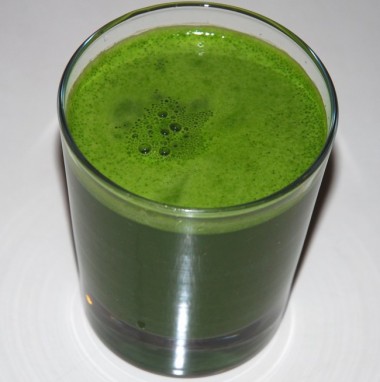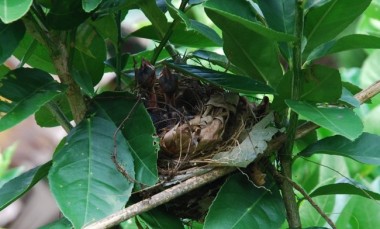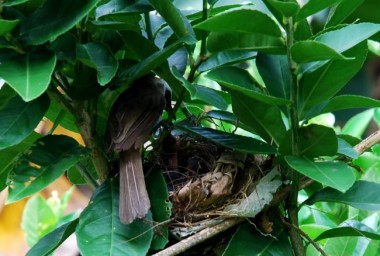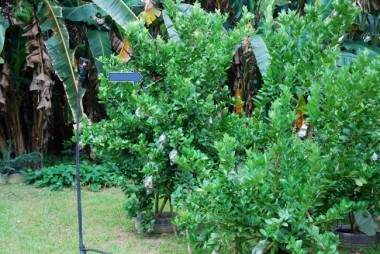Jun 01, 2012
Eat More Plants...
I am wary about juicing vegetables, especially modern vegetables. They have been hybridized to grow too fast, and too ‘sweet’ and ‘juicy’. It is like broiler chickens – they are hybridized to grow fast and to develop large breasts.
Our tests have shown a change in the nutrients content of the broiler meat due to changes in dietary requirements to meet its fast growing nutritional needs. For example, saturated fats and omega 6 content sky-rockets, making it an ‘unbalanced’ meat, whether organic or not.
The same must apply to modern hybridized vegetables and fruits. They require more nitrogen for one. What happens to all these nitrogen in the plants, and what happens to us when we consume these day in and day out? And when they grow so fast, do they really have the time to absorb all the micro-nutrients in the soil that our body needs? Again, it does not matter whether the plants are organic or not. A fast growing plant is a fast growing plant and have the same nutrient requirements, whether organic or not.
For me, plants are essential for our health. So, for juicing, I juice PLANTS, not necessarily vegetables.
Here’s a plate of leaves and flowers that I use to juice:
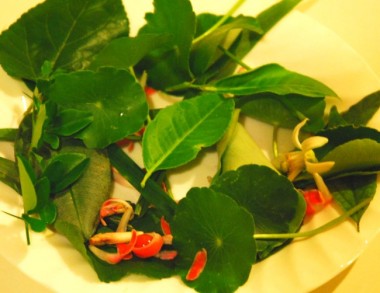
(Click on pics to enlarge)
Leaves and flowers of plants which do not contain anti-nutritional factors like oxalates, which are slow growers, which have been tested in laboratories to have high antioxidants, etc.
Here’s to your health – juice of PLANTS (not vegetables).
11:26 Posted in Blog, Slow Food / Rare Receipes | Permalink | Comments (2) | Tags: juicing of vegetables, juicing of leaves, juicing of plants, pegaga, bunga kantan, lemon flower, red ginger, cekur
May 19, 2012
Free Range? Pastured? Factory Raised?
Farming terms are being used by corporations to market their produce. For example, 'ayam kampung'. Ayam Kampung implies a chicken that's roaming around freely. But the modern day ayam kampung that you purchase is most probably raised in a factory and have never seen the sun or eaten a single blade of grass.
And how about 'Antibiotic Free'? That has been cleverly marketed to mean 'organic'. Thus a factory raised broiler which may be selling for RM7.50 to RM8.00 per bird is being sold for RM20.00 just by positioning it as antibiotic-free. It is super profit from consumer ignorance and clever marketing.
Here's a video talking about the lexicon of sustainability hijacked by companies:
http://grist.org/sustainable-farming/the-story-of-an-egg-...
Here's a video by PEMANDU / ETP with a segment on our farm:
http://www.youtube.com/watch?feature=player_embedded&...
We are the ONLY pastured poultry farm in Malaysia and we have been doing so since 2001!
14:46 | Permalink | Comments (0) | Tags: organic eggs, pastured chicken, grassfed chickens, pastured eggs
Eggs - What's That Wiggly Thingy?
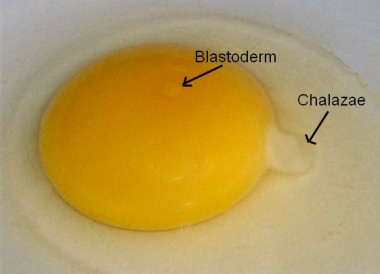
A store is no longer stocking our grassfed, free range eggs because a couple of their customers complaint about that 'wiggly thingy' found in our eggs, and that obvious round disc on the egg yolk.
Well, if we were the store owner, this is what we would say to the customer:
1. We try to give our hens as natural a life as possible. This includes plenty of space to roam, grass to eat, and surprise, surprise, a 'husband'. So, as is normal when wives and husbands get together, eggs get fertilised and babies are born. So that disc on the yolk is a fertilised germinal disc, or blastoderm. Unfertilised eggs will have just a speck. Fertilised eggs will have a disc. And we promise you, eating fertilised eggs will not make you more manly and sprout whiskers, nor will it make you pregnant, nor will it make your unborn baby develop 'chicken brainism', a brain disease of unknown origins.
2. And that wiggly thingy is the chalazae, made of the same material as the white of the egg and intended to hold the yolk in place. Chalazae is prominent in the freshest of eggs. It dissolves and disappears as the egg ages. So, dear customer, the eggs with absolutely no chalazae that you have been eating are clearly not fresh inspite of the words printed in bold on the label, Farm Fresh. 'Chicken Brainism' is a disease common amongst modern consumers and we have no idea where the disease comes from but we can assure you it does not come from eating fresh eggs from hens that are allowed to lead as natural a life as possible.
12:10 Posted in Blog, Chickens | Permalink | Comments (0) | Tags: organic eggs, free range eggs, blastoderm, chalazae
May 16, 2012
More Visitors - Special Officer to Minister Of Health
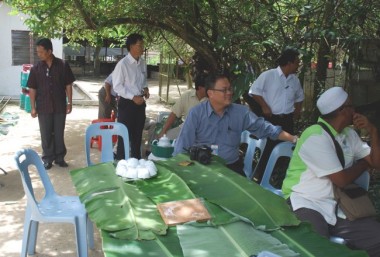
Mr. Chew, P.A. to Minister of Health, came with members of MOA Inc, Bentong. When we started farming years ago, never knew entertaining visitors is part of the business.
Hope he can convince the Minister to visit. Would love to share some info on consumer health issues with him.
18:18 Posted in Blog, Visitors | Permalink | Comments (0) | Tags: chew yoon ee, liow tiong lai, minister of health, moa inc.
May 14, 2012
Poultry Diseases - Natural Cures I
Leucocytozoon sp (chicken malaria) infection is common amongst poultry in a tropical humid country like Malaysia. Todate, worldwide, treatment is by drugs, in particular sulphamonomethoxine sodium, an antibiotic.
Indications are:
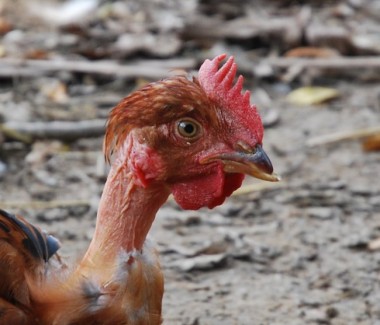
Beginnings of cyanosis - possible spleen damage
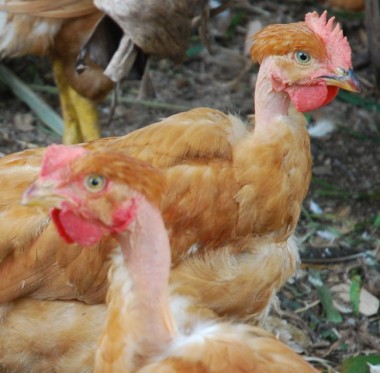
Normal faces
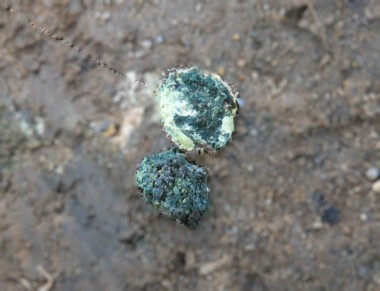
Greenish faeces - rule out Newcastle Disease first.
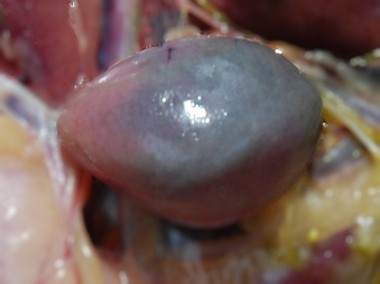
Inflamed and damaged spleen
Mortality varies. If untreated, mortality can reach 30%.
At our farm, we use herbal medication which is grown within the farm:
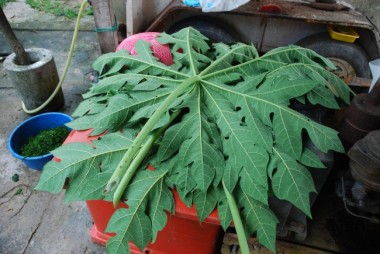
Papaya leaves, hempedu bumi (andrographis paniculata) and patawali (tinospora crispa, tinospora rumphii), pounded to extract a juice
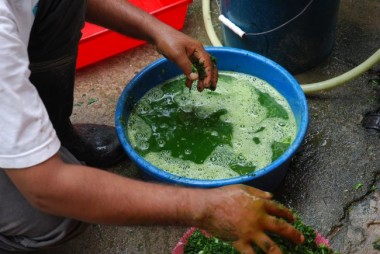
Ratio by volume is papaya leaf 70, hempedu bumi 20, patawali 10
10 liter herbal extract concentrate to be mixed with the drinking water for the day for 1000 chickens.
After 24 hours, the chickens will start to show some mild improvement.
After 48 hours, the faeces will begin to clear and the appetite will be about 70% back.
The juice can be withdrawn when the feed consumption returns to normal.
No drugs is necessary. This treatment is first published in this blog and is now OPEN SOURCE.
Leucocytozoon is spread by blood sucking insects. So, prevention is always possible and encouraged.
Surah 26: 7 – 8, Have they, then, never considered the earth how much of every noble kind (of life) We have caused to grow thereon? In this, behold, there is a message, even though most of them will not believe.
May 10, 2012
They Lose All Sense Of Fear - III
Yellow Vented Bulbul (pycnonotus goiavier) are wild birds. But in our farm, they will nest anywhere. Here's three hatchlings blown down from their nest on top of a 7 feet marcotted lemon tree. The nests of bulbuls are flimsy.
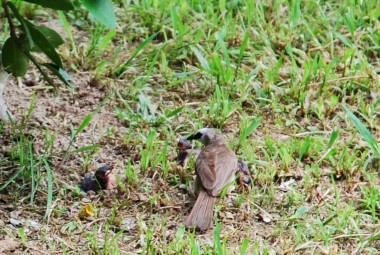
These birds are no longer transcient, but permanent residents of our farm. To turn your farm into a sanctuary, the rules are simple. Keep a few fruit trees for the birds. Never ever use chemicals; you not only kill some of the more sensitive ones, but you deprive them of insects for food. Never ever kill a single bird. That's it. In no time, your farm becomes a bird-watchers heaven.
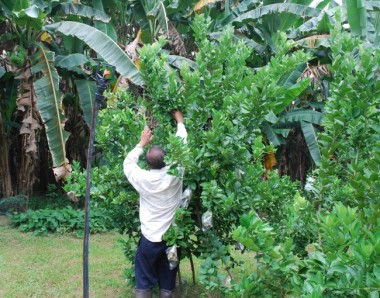
Farm manager, Razaly putting the hatchlings back.
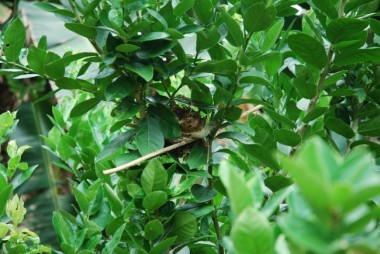
And secure the nest with a prop
Calling for mom after that harrowing experience
Mom's back
And All's Well Again At DQ Farm!
18:28 Posted in Blog | Permalink | Comments (0) | Tags: yellow vented bulbul, taming wild birds
May 09, 2012
How To Make Money From A Small Piece Of Land
In other words, if you can grow your own food, you are empowered!
A crew from a production house working for Pemandu / ETP came to film how you can make money from a small piece of land and afford the RM10.00 cups of coffee at Starbucks.
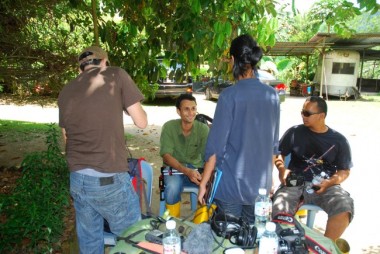
Getting ready
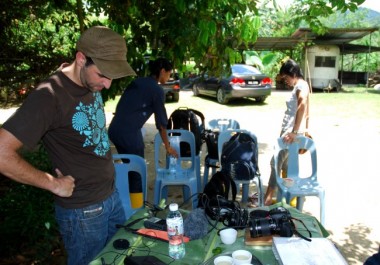
Checking sound levels
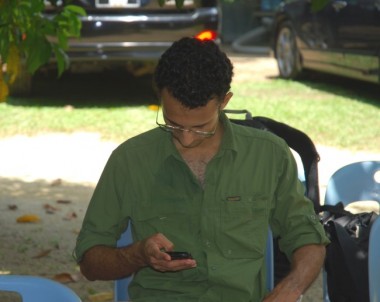
After the shoot, texting about the chicken that got away (really).
12:06 | Permalink | Comments (1) | Tags: micro farm, nova ceceliana nelson, handy jobs sdn. bhd., pemandu, etp
Apr 28, 2012
Anti-Lynas And 'Clean-Up' Sit-Down At Independence Square


Sea of Yellow and Green - from PDRM's YouTube Channel

About 50,000 around Masjid Jamek, where we were


Just ordinary folks, like you and me

Ordinary, God-Fearing people.
Pudu:
http://www.youtube.com/watch?v=3Qrx6RZwZAI
KLCC:
http://www.youtube.com/watch?v=B-fp9rxLago&feature=en...
Masjid Negara:
15:37 | Permalink | Comments (0) | Tags: lynas, rare earth plant pahang, anti-lynas, perhimpunan hijau, bersih 3.0
Apr 13, 2012
Wildcrafted Food
The thing about keeping the farm environment as natural as possible is that there’s so much wildcrafted food around.
Taking a walk today in one of our ‘wild corners’, there ahead of us are some wild mushrooms:
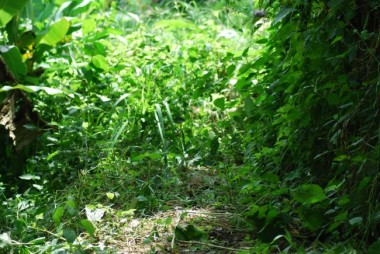
A corner kept 'wild' for its 'Qi'
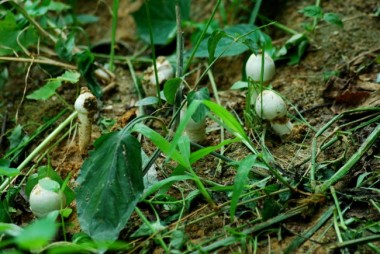
Cendawan Busut (Termitomyces albuminosa) or Termite-Hill Mushrooms just ahead of us.
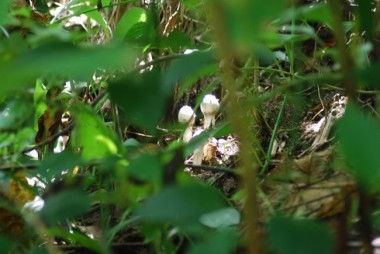
More mushrooms at the side, on slightly elevated grounds.
Further ahead of us, round a corner, a patch of daun meranti, a solanum nigrum variety that has a long history of safe consumption among village folks.
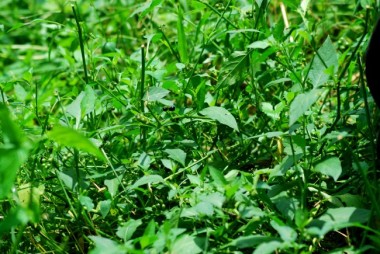
Solanum nigrum var. patch
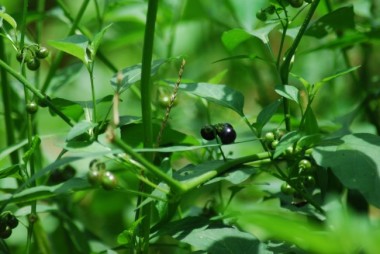
Fruits of the plant, considered toxic in some varieties, especially the green fruits. On the safe side, best to avoid consuming them.
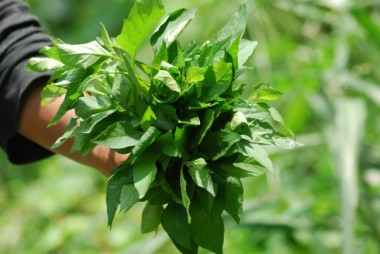
Delicious stir-fried.
Frankly, wildcrafted food is our preferred food. At any given day, we would have wild eels, mushrooms, fruits and so many different varieties of vegetables.
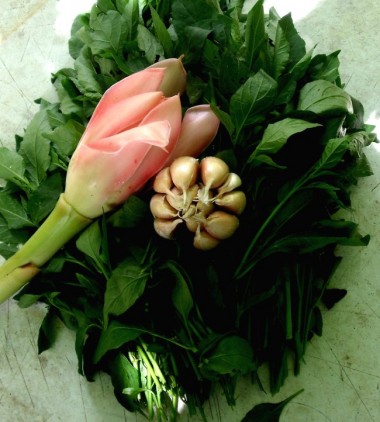
Ingredients for a 'wild' lunch: daun meranti, bunga kantan and some garlic.
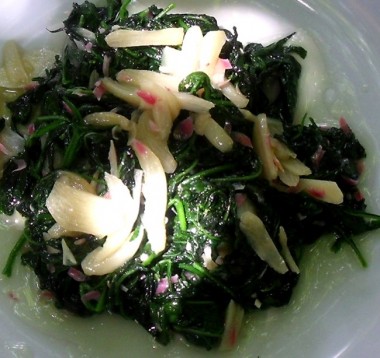
Sweet yet bitterish daun meranti with a hint of kantan aroma, and of course garlic to bring it all together. A light, healthy lunch; great by itself or with some rice.
Wildcrafted foods are not bred to grow fast, nor bred to exhibit a certain characteristic such as a particular color, or a particular flavor, or in most cases, to make it sweeter.
In many ways, it would be a more “balanced” food. By this I mean you are not going to have fruits that are so sweet that it affects your glucose level adversely, or vegetables with excessive nitrates, etc.
These are foods made by Nature, not altered by man to suit man's taste-buds or to suit marketing and production requirements.
17:16 | Permalink | Comments (0) | Tags: wildcrafted food, solanum nigrum, daun meranti, slow food, bunga kantan, torch ginger, etlingera elatior
Apr 11, 2012
Birds Nesting At Our Farm - II
We were surprised to find that the nest of Treron Olax have not only hatched, but have fledged. There they were a family group, three fledglings and three adults hanging on to some branches of a tree about 10 meters away from their nests.
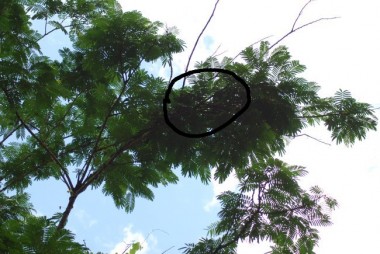
A flimsy platform in our petai tree was where they made their nests overlooking the staff kitchen and dining area and the noise of tractors and chattering workers. These are supposedly forest birds.
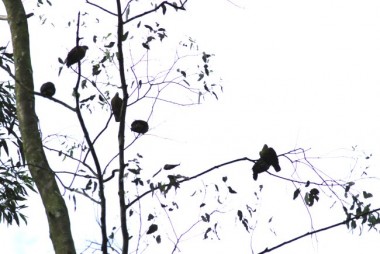
Three parents guarding over their fledglings. Sorry about the bad photography, clearly I need some lessons. The birds flew from their nests at 7am and hung on to this tree 10 meters away, for two hours.
Then with a loud flutter, as if by a common signal, they flew off at speed simultaneously towards the nearby forest. Wonder why they are not nesting in the forests? Poachers?
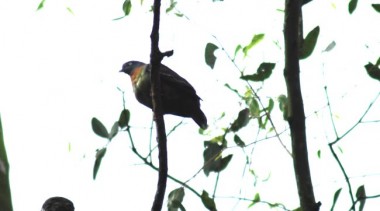
The male
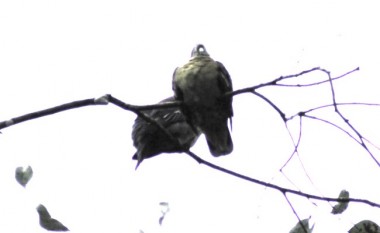
One of the females next to a fledgling.
Treron Olax or Little Green Pigeon is a resident bird in Malaysia. Will have to get better equipment to document all these birds at our farm, plus take some lessons.
Here's a couple of photos showing the birds in their glory from http://www.tomo-rhino.com/malaysia/
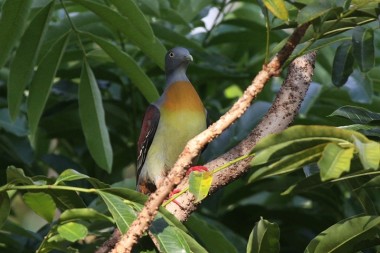
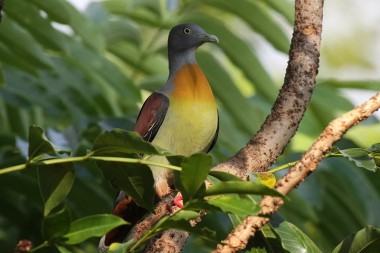
Treron Olax is a protected bird in Malaysia.
10:30 | Permalink | Comments (0) | Tags: little green pigeon, treron olax
















